Your Myers-Briggs® Personality Type and Cleanliness
Are you a self-confessed “neat freak” but your partner leaves their dirty clothes all over the bedroom floor? Are you always misplacing your keys because you absent-mindedly put them down while your mind wanders? Many people have drawn connections between personality type and cleanliness, but where do these connections come from? Are certain types inherently more clean than others? That’s what we’re going to be exploring in today’s article!
Not sure what your personality type is? Take our personality questionnaire here. Or you can take the official MBTI® here.

Personality Type and Cleanliness – Is There a Connection?
The Influence of Upbringing:
Before we get into personality type, of course we have to delve into the enormous impact of upbringing. If your parents enforced a neat, clean household and established standard chores and cleaning routines throughout your life, it might become automatic to be clean regardless of your type. If your parents were really messy and you despised living among cockroaches and foul smells, you might have created a personal value of cleanliness and determined that you would never emulate their actions. While type may tell us some tendencies of the 16 personalities, it can’t absolutely state that a certain type will or won’t be a neat freak or messy and disorganized.
Cultural Influences:
Certain cultures prize cleanliness more than others. Germany, for example, is well renowned for it’s cleanness. Everyone in a neighborhood or apartment complex takes turns with the tasks of sweeping, picking up trash, and generally cleaning up the area. In Japan, upon entering the home, you immediately take off your shoes, gargle, wash your hands, and change your clothes. Cleanliness is considered a spiritual practice as much as a practical one there.
Getting Down to Type:
If we look at type alone then certainly there can be some connections to type and cleanliness, but I urge you to keep the above points in mind. Anyone, regardless of type, can have a personal value of keeping things clean or not worrying about cleanliness for the sake of a “higher” calling. Everyone is unique and has many influential experiences that guide their attitude towards cleanliness.
ENFPs and ENTPs and Cleanliness:
ENFPs and ENTPs are fixated on the world of ideas and possibilities. They long to find something original and thought-provoking to channel their energy into and, as a result, they often have many hobbies and interests. These types have active and creative minds that are always on the lookout for an unusual thought, a new way of understanding something, or an opportunity that could change their lives. The routine, maintenance aspects of life are far less interesting or attractive to them. In fact, many ENTPs and ENFPs rebel against routines and limits, choosing instead to follow their creativity wherever it may lead. This can often result in a messy or disorganized living space as the mundane tasks of tidying up seem mentally suffocating or mind-numbingly dull. It’s not unusual for these types to misplace their keys, eyeglasses, or wallets on a regular basis.
A Caveat:
Some ENFPs and ENTPs may maintain a personal value around cleanliness. Maybe they simply want to be the kind of people who others feel comfortable visiting. Maybe they are maturing as people and becoming more patient with the routine, maintenance categories of life (this often happens in the 30s and 40s for ENPs). As always, there are exceptions to the rule for any type.
Read This Next: The Unique Intelligence of ENFPs, ENTPs, INFPs, and INTPs
ESFPs and ESTPs and Cleanliness:
ESFPs and ESTPs are extremely detail-conscious people. They take in their surroundings fully and enjoy aesthetically pleasing environments. While they hate mundane, routine chores, they also despise mess, clutter, and ugliness in their surroundings. Because of this they often try to find a way to make cleaning fun. Whether they’re blasting an upbeat playlist while they sweep or belting out love songs while they do the dishes, these types look for ways to add some pizzazz to even the most tedious tasks. These two types are less likely to be as messy as many other perceiving types.
A Caveat:
As with any type, there are always exceptions. If an ESFP or ESTP is overwhelmed by work tasks and mundane obligations, they will likely prioritize freedom, relaxation, and fun during their free time. They may simply make peace with the mess of life so that they can experience the joy and fulfillment of a night out or another fun experience. If they’ve been through a major life event (divorce, job loss, etc.) they may also de-prioritize a neat and tidy home.
Read This Next: The Unique Intelligence of ESFPs, ESTPs, ISFPs and ISTPs
INFJs and INTJs and Cleanliness:
INFJs and INTJs focus on patterns and predictions and are always on a quest to find the deeper meaning of life itself. These big picture individuals like having a clutter-free, tidy environment so that the mess isn’t distracting them from their creative ventures or visionary strategies. However, they hate feeling like they’re being micro-managed or pressured on a time-crunch. Many INFJs and INTJs use cleaning time to let their minds wander to creative or philosophical musings. If they’re particularly absorbed in a thought, they may let their surroundings go a bit while they explore their minds. For these types, a clean environment is often less about being in line with societal standards and more about having a space that supports their cognitive processes.
INTJs will typically be more organized in their cleaning process than INFJs. Because INTJs are focused on maximum efficiency, they will likely have their kitchen tools organized in order of frequency of use, their clothing arranged by season and color, and their bookshelves sorted by genre or author. They get a sense of satisfaction from having a place for everything that saves them time, energy, and effort.
INFJs, on the other hand, are more focused on meaning, emotion, and relational value. They may have a messy drawer for sentimental items or a creative space that’s full of half-finished projects. To an INFJ, these things hold value and meaning, even if they don’t appear tidy or organized to others. INFJs may also not organize their home for maximum efficiency like the INTJ will. They may have a neat and tidy kitchen, but the places they put everything may not make the most logical sense.
A Caveat:
There are always exceptions to the rule for any type and that includes INFJs and INTJs. If an INFJ or INTJ is dealing with a lot of stress they may let their living space become messier than usual. This is often due to a combination of not wanting to deal with the mess and cognitive overload. These types may feel like they can’t keep up with the demands of their life, let alone clean their homes. However, most INFJs and INTJs eventually return to their usual standards of cleanliness once they’ve had some time to recover from a period of stress.
Read This Next: Here’s Why INFJs and INTJs Seem Intense
ISFJs and ISTJs and Cleanliness:
For the ISFJ and ISTJ personality types, having a sense of order and cleanliness gives them peace of mind. They notice the little things and feel satisfaction when their environment is free of dirt, dust, and clutter. These types like cozy, homey environments with plenty of personal touches.
ISFJs and ISTJs are both detail-oriented, but they tend to approach organization a little differently. ISTJs are all about efficiency, so they’ll typically have a place for everything and follow a strict cleaning routine. This can often be seen in their kitchens, which are usually spotless and well-organized. ISFJs also like having an organized home, but they’re more likely to prioritize comfort and coziness over efficiency. For them, it’s about creating a warm and inviting space, not just a functional one. As sentimental types, they’re likely to have nostalgic or meaningful items out on display.
A Caveat:
Like all personality types, there are always exceptions to the rule. If ISFJs and ISTJs are stressed or overloaded with tasks (for example, they have a lot of children or a demanding job) they may let their living space become messier than usual. In these cases, they may still have a few areas that are tidy and well-organized, but the rest of their home may be in a state of disarray. ISFJs may prioritize their relationships over cleaning and ISTJs may prioritize their work performance over the organization and cleanliness of their home.
Read This Next: 10 Unique Qualities of the ISFJ, ISTJ, ESFJ and ESTJ Personality Types
ENFJs and ENTJs and Cleanliness:
ENFJs and ENTJs are visionary individuals who have big dreams and goals for the future. Both types tend to enjoy having people over and attempt to keep their surroundings clean so that spontaneous get-togethers are easy to arrange. ENTJs are concerned with efficiency and like to have a logical place for everything in their home. Their goal is to minimize the cleaning routine as much as possible so they can focus on more stimulating ideas and goals. Thus they usually don’t mind throwing clutter away and they try to keep the number of objects in their house to a minimum so they can spend as little time as possible tidying up. ENFJs are also interested in efficiency, but they’re more focused on relationships and personal, meaningful experiences and items. They likely have symbolic items with sentimental value around their home, even if it means having more clutter.
A Caveat:
Like always, there are exceptions to the rule. If ENFJs and ENTJs are pressing towards a goal that is consuming a lot of their energy they may let their living space become messier than usual. This can be due to a combination of being preoccupied with other thoughts and not wanting to deal with something that seems trivial in comparison to their goals. ENTJs may go on a “decluttering spree” and throw out many items that are making a mess. They may also temporarily use paper plates and cups to avoid doing dishes. ENFJs may also let their home become messier than usual if they’re going through a tough time emotionally. They may not have the energy to keep up with their usual routine and may start to see cleaning as a pointless task.
Read This Next: The Unique Intelligence of the ENFJ, ENTJ, INFJ and INTJ Personality Types
ESTJs and ESFJs and Cleanliness:
ESTJs and ESFJs like having a sense of order, routine, and homey-ness in their lives. Both types appreciate a clean and tidy living space, but they tend to go about achieving this goal in different ways. ESTJs are very detail-oriented and follow a strict cleaning routine. They’re likely to have a place for everything in their home and may even keep a cleaning schedule. This can sometimes be seen as inflexible or overbearing to others, but it works for them. ESFJs also like having a clean and tidy home, but they’re more likely to prioritize comfort and coziness over efficiency. For them, it’s about creating a warm and harmonious space, not just a functional one. As sentimental types, they’re likely to have treasured knick-knacks and family photos out on display.
A Caveat:
Like always, there are exceptions to the rule. ESFJs will typically prioritize relationships over cleaning and orderliness. So if their relationships are in jeopardy or someone they love is struggling, their house may get messier or more disorganized. I knew an ESFJ who had a constantly messy home, but she had six homeschooled children and a part-time job, so she prioritized connecting with her family over keeping everything neat and tidy. ESTJs may also let their living space become messier than usual if they’re going through a difficult period in their lives. This can be due to a combination of being preoccupied with other thoughts and not wanting to deal with something that’s getting in the way of their massive to-do list.
Read This Next: The Unique Intelligence of the ESFJ, ESTJ, ISFJ and ISTJ Personality Types
ISFPs and ISTPs and Cleanliness:
ISFPs and ISTPs are both detail-conscious people with a love for aesthetic beauty or clarity. These types tend to get annoyed by needless clutter or decorations and furniture that clash. While they may not have a cleaning routine or absolutely pristine surroundings, they do like to have a space that feels open, free, and inviting. ISFPs are more likely to achieve this by having a few key pieces that they love and filling their space with things that inspire them and blend perfectly in color and tone. Their space is likely to be utterly and completely designed to their individual tastes. When you walk into an ISFPs home, you’re learning about who they are, not just seeing where they live. ISTPs are more likely to achieve a sense of order and cleanliness by being very efficient with their space. They’re likely to have storage solutions for everything and to be more minimalistic. Even if their home doesn’t look “clean” to others, it’s likely that everything has its place and is easy to find.
A Caveat:
Everyone is different, and there are exceptions to the rule. ISFPs and ISTPs may let their living space become messier than usual if they’re going through a tough time emotionally. Or if they’re micro-managed or feeling overwhelmed by outside demands, they may prioritize free time, relaxation, and hobby time over housework.
Read This Next: Here’s What It’s Like Inside the Mind of an ISFP, ISTP, ESFP or ESTP
INFPs and INTPs and Cleanliness:
INFPs and INTPs are both creative types who enjoy having a space that reflects their unique personality. They’re likely to have a few key pieces that they love and to fill their space with things that inspire them. Their homes are likely to be full of books, art, and other items that have meaning to them. In general, they’re not too concerned with having a “clean” or “tidy” home, but they may have periods where they’re more focused on organization than others. INFPs are dreamers who likely have movie posters, books, and sentimental items scattered purposefully around their living space. For them, their home is a reflection of their inner world and their unique personality. INTPs are more likely to have a “laboratory” type setup, with plenty of books, a computer, and materials for their latest project. Both types tend to struggle with cleanliness because they are preoccupied with their inner world and the outer world seems less important.
A Caveat:
Some INFPs and INTPs grew up with parents who instilled a sense of order and cleanliness in them. Others may have had a chaotic childhood and they’ve vowed to never live in such disorder again. While most INFPs and INTPs don’t prioritize a pristine home, there are always exceptions to the rule.
Read This Next: Here’s Why INFPs and INTPs Get Misunderstood
What Are Your Thoughts?
Did you enjoy this article? Do you have any insights or experiences to share? Let us and other readers know in the comments!
Find out more about your personality type in our eBooks, Discovering You: Unlocking the Power of Personality Type, The INFJ – Understanding the Mystic, The INTJ – Understanding the Strategist, and The INFP – Understanding the Dreamer. You can also connect with me via Facebook, Instagram, or Twitter!
Sources (Other Than My Own Observations and Experiences):
Psychological Types: Why Are People So Different? 64 Portraits in Socionics. How each of the 16 Jungian types varies in 4 main ways by Victor Gulenko, Ph.D.
The Art of Speed Reading People by Barbara Barron-Tieger and Paul Tieger


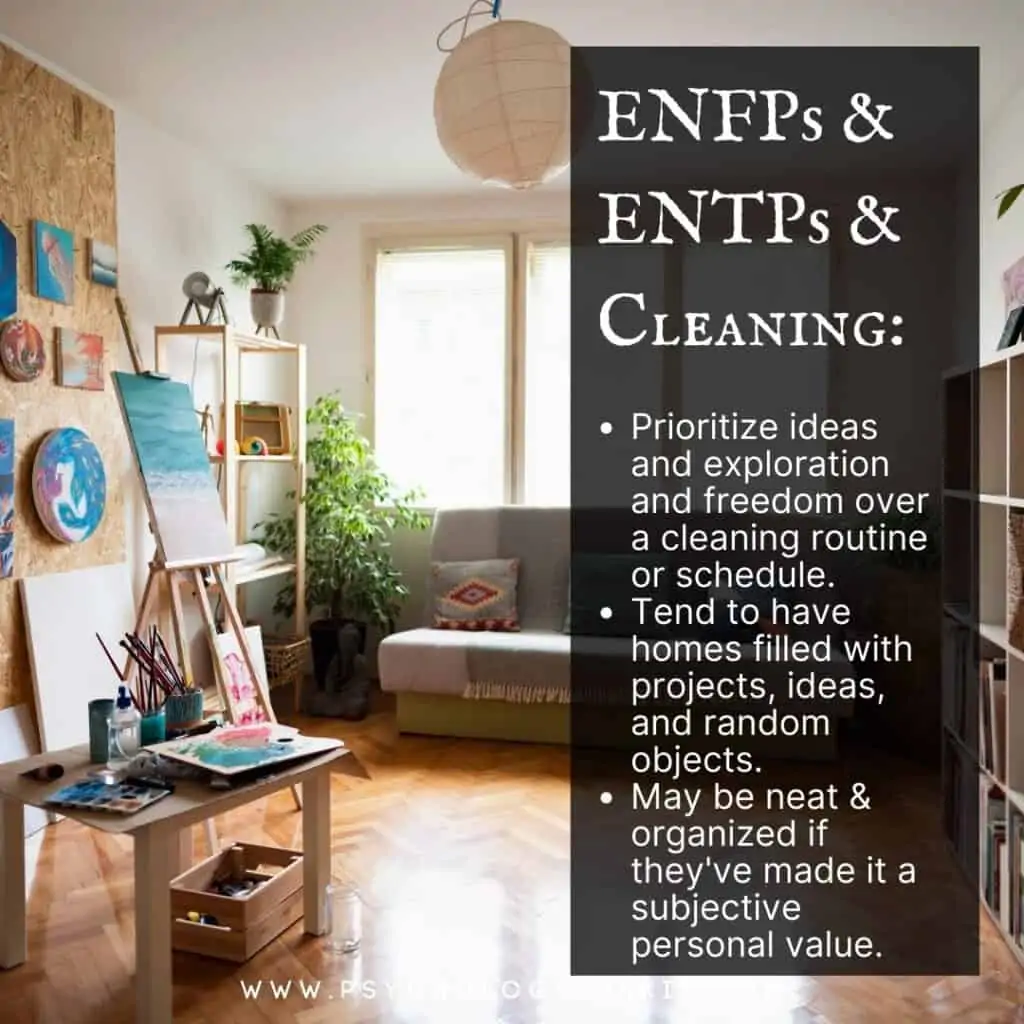

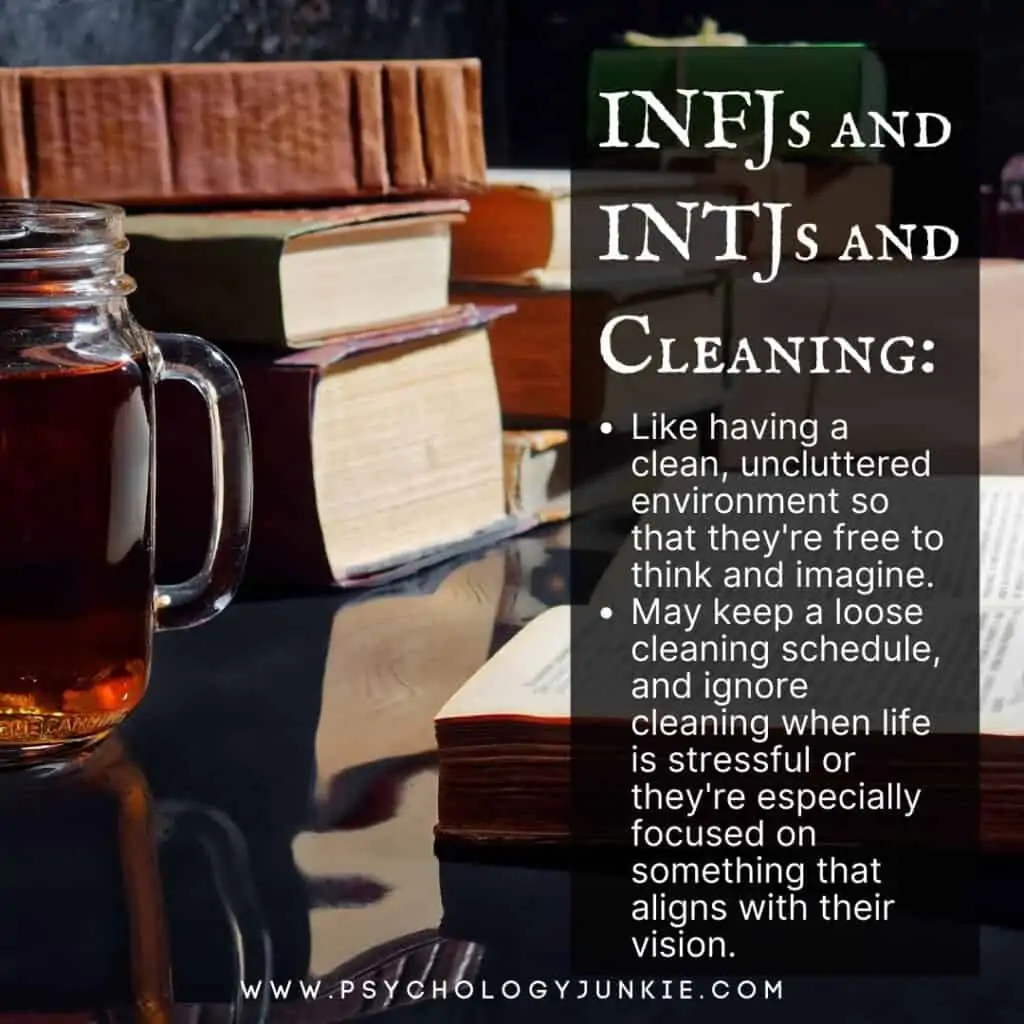
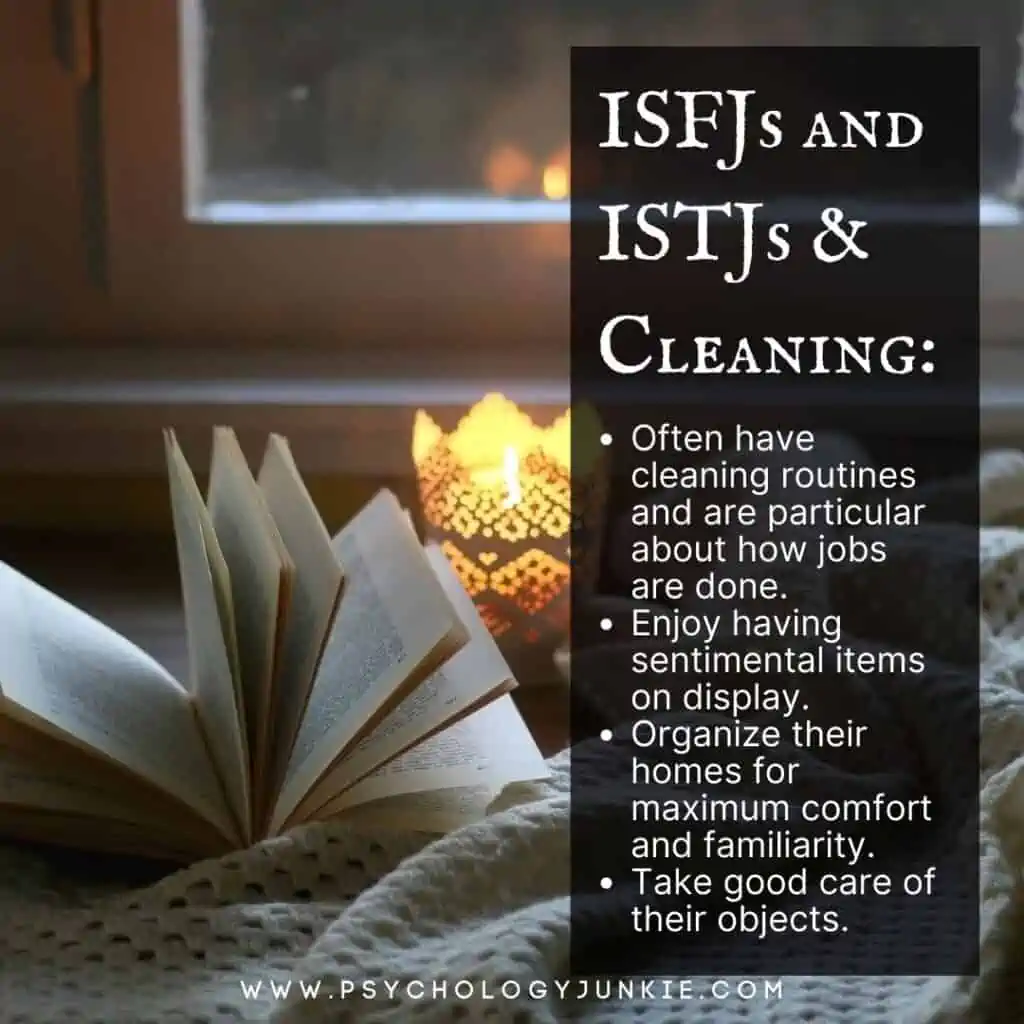
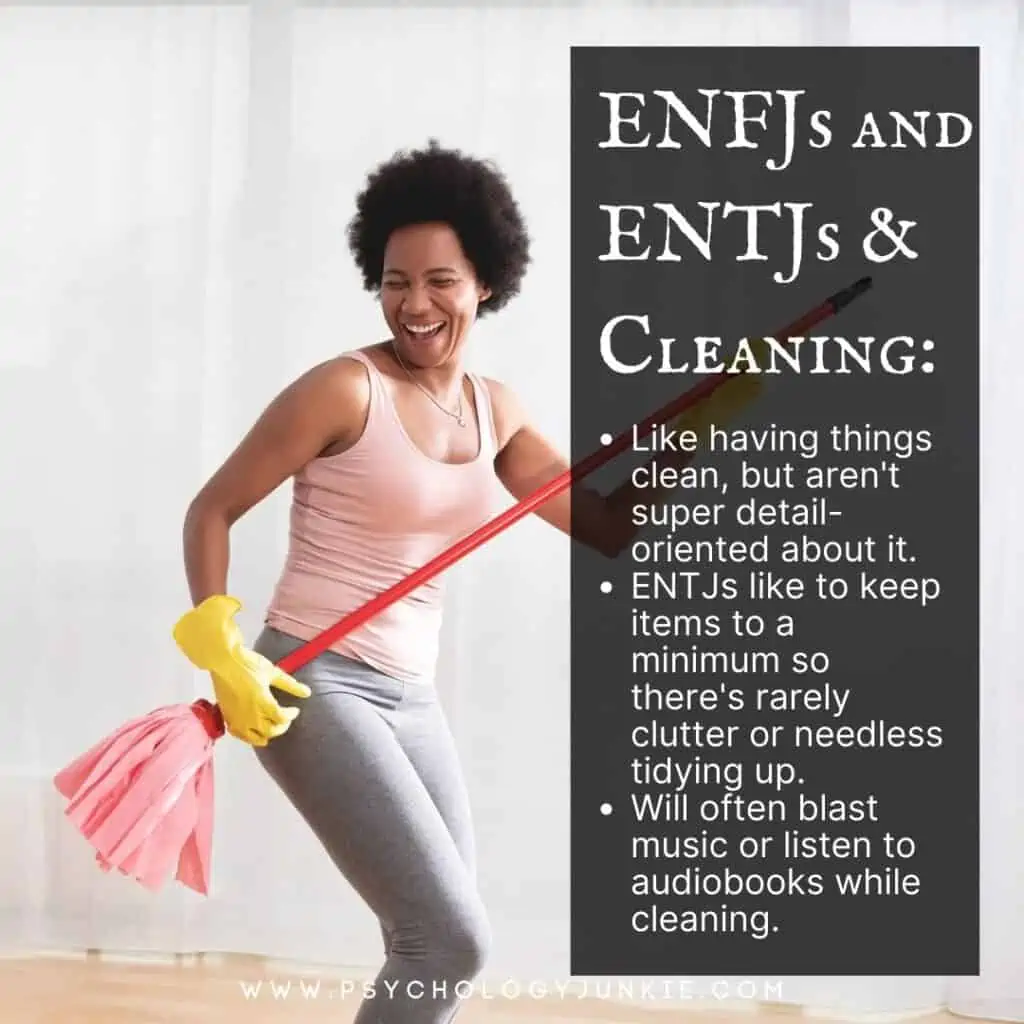
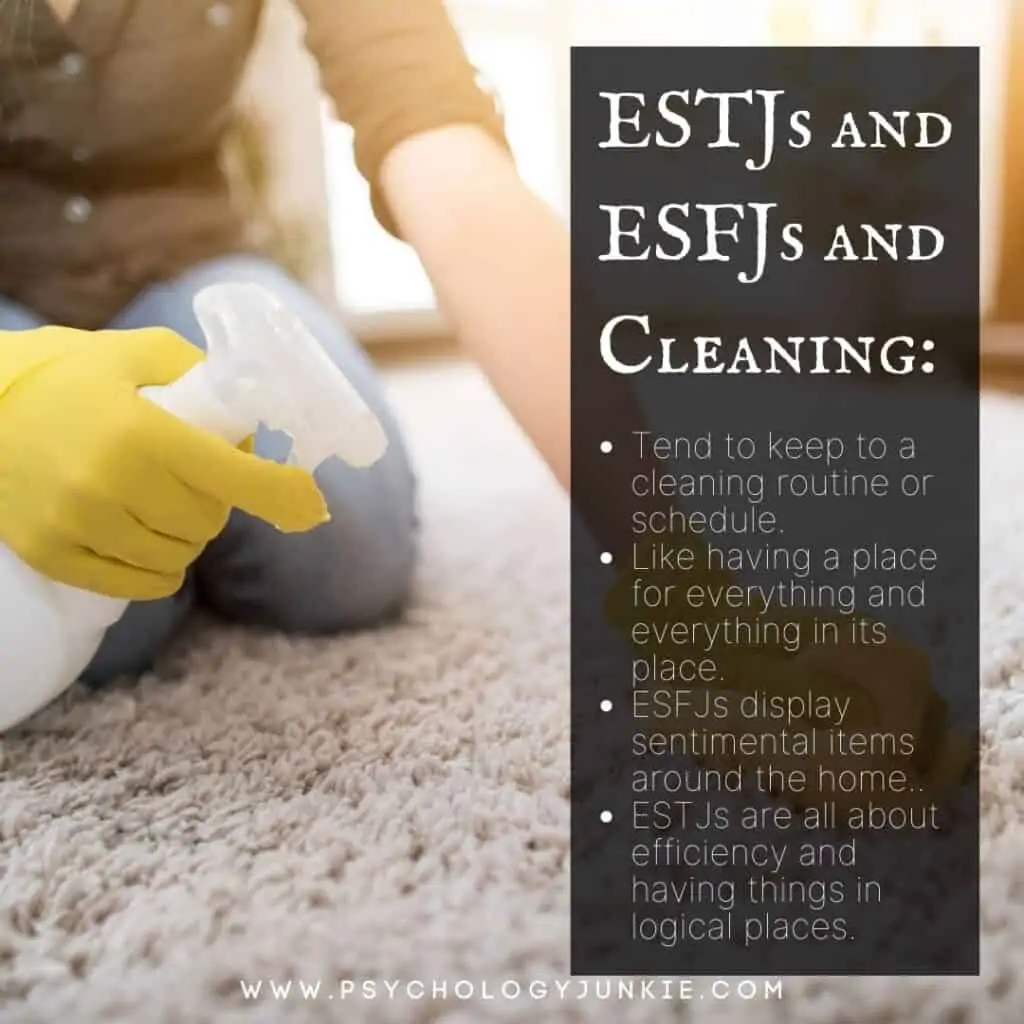
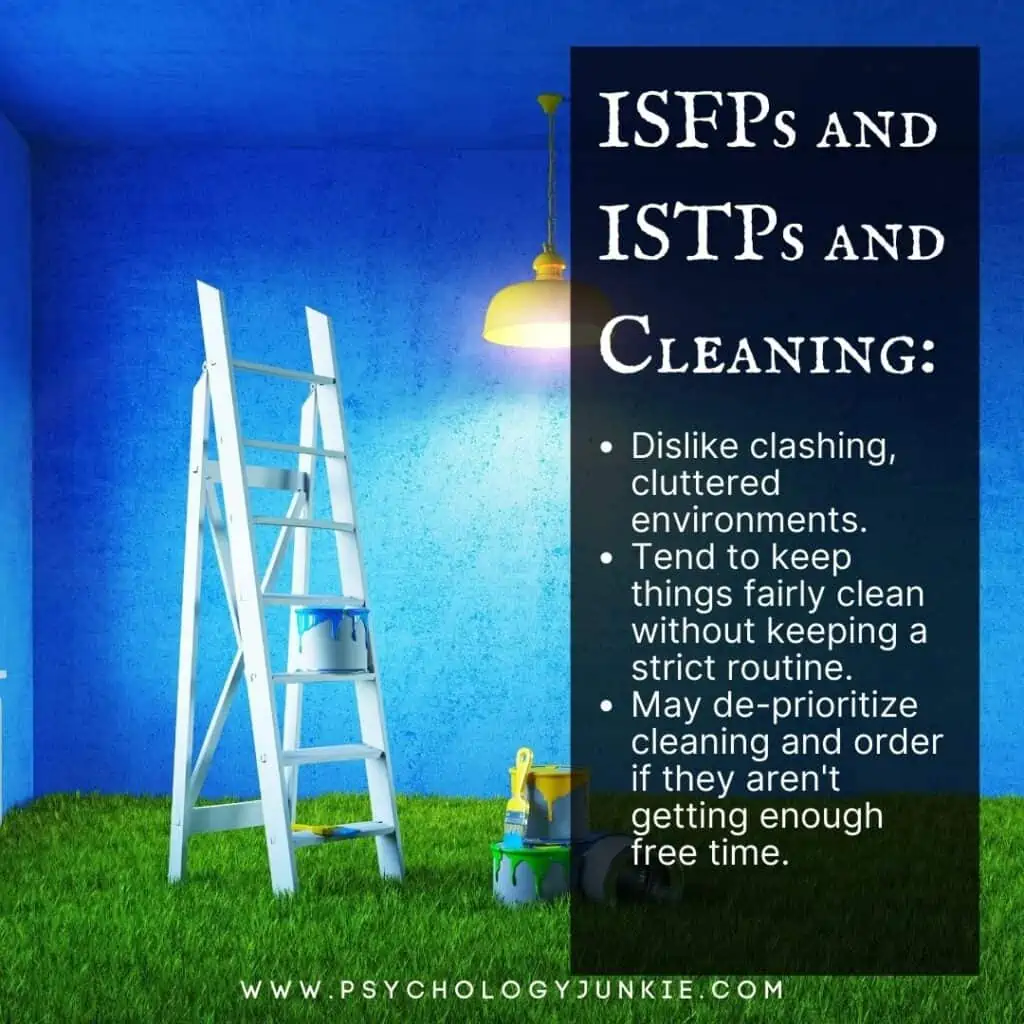
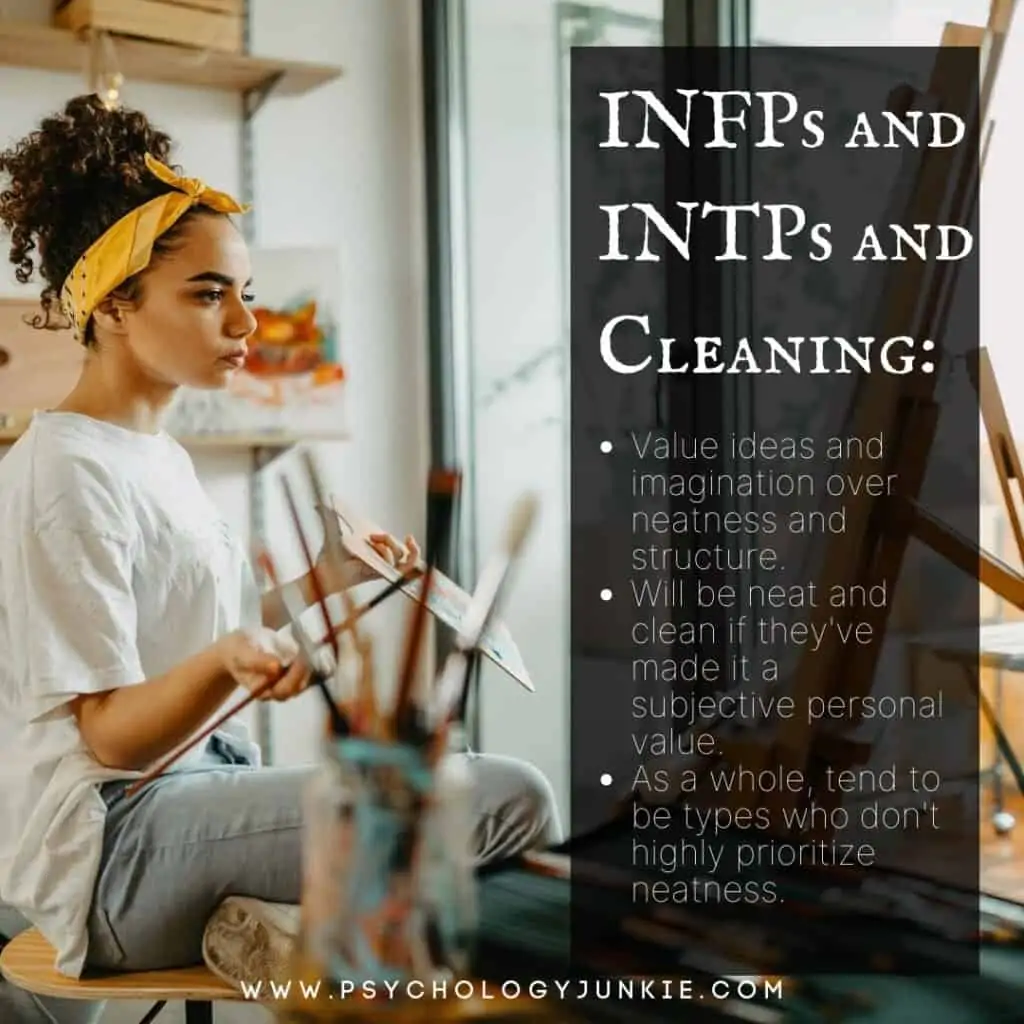





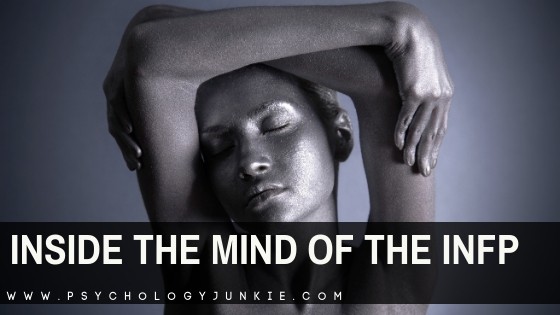
Spot-on, I’d say, Susan. I love articles like this and you write them so well.
While I have come out as INFJ nearly every time, the F and T are so close in some tests. The T feels most like me a lot of the time. That may be due to my work as a handwriting consultant over the last 40 years. I was often called in to deal with personality conflicts between managers and their subordinates.
Frequently, the problem was the difference in thinking pace, which affected communication. If the manager was fast, patience was tested if the other person was more deliberate. I observed how each viewed the challenge and helped them see the advantage of each other’s style and how they could learn to appreciate the strength each could contribute to the common objective. When it worked out that way, it was so great to hear the boss get back to me with feedback. When it didn’t, and the conflict persisted, to tell you the truth, it was a pity some of the managers were not the ones to go. Those who failed to value the support of careful, accurate workers. Some companies eliminated the subordinates instead.
I live in Ecuador and only teach handwriting analysis now.
Keep up the good work. I read every word.
Great article, Susan. I appreciate the time you took to do the necessary research for this article and point out that there can be exceptions to the rules.
Thank you Alice! I appreciate your feedback so much!
I’m an infp and this doesn’t describe me at all.
Thanks for your feedback! I’d love to know what doesn’t resonate!
Dear Susan,
Thank you for this article.
As an INTJ, I conclude I am more organized than clean, if that makes sense.
Sharing a room growing up with my ‘P’ brother – under a ‘J’ (German) father – the room had to be clean & tidy, with the beds made. There was an inspection every morning. There were consequences for failure. (I ended up doing more than my half on a regular basis!)
I sense in my own children (where I tried to have a similar daily goal), the level of ‘tidy’ was noticeable by type. However, my extroverted ‘P’ son is a ‘clean freak’ and snappy dresser second to none, with the (relatively) messiest room. Clean but disorganised…
My ‘J’ wife, raised by ‘P’ father and ‘J’ German mother, is super clean, but relatively messy. I will often put her shoes together and pop them away after they are left in the lounge room. However, I never have to ‘clean-up’ after her. Messy with the shoes (relatively), but clean.
In the kichen especially, everything is clean. It is just not as organised as I would have it. But nothing like living with my brother. (And she loads the dishwasher wrong (imho), but I so love her, I let it go.)
As for me, my shirts are organised in season and colour, all facing (and hooked) the same way.
However, I have been made to change a shirt I have put on because of a mark or blemish or frayed collar that I don’t ‘see’.
Life is a kaleidoscope of beautiful intricacies. I like reading your articles to make sense and understand the world around me…
and to have a chuckle…
and maybe improve in areas in my blind spot.
Please keep up the good work.
TonyW
INTJ
If you looked at most of the rooms in my house, you would see comfortable furniture, meaningful (sentimental) decor, space to move, low-contrast colors, non-bright lights, but also lights in all cabinets and closets, and organization that makes sense. very little “clutter”. Then you would peep into another room and see a clutter of tools/craft supplies/random decor items/photo albums/florals, etc. in a wild sense of disorder. And it wouldn’t make any sense! But I would be able to find whatever I needed in that mess. I’m an INFJ who lives with an ISTP husband.
Always on point!
Love this! Love that you had the “caveat” sections, made for a even more interesting read 🙂
WOW. I am an INFP female living with an INTP male.
You are so right on. I have my art and he has his computer and so many books! I think this was your best analysis yet. The only reason I do not have movie posters up is that when I try to buy one, I get overwhelmed and cannot decide which I like best.
“INTPs are more likely to have a “laboratory” type setup, with plenty of books, a computer, and materials for their latest project.”
Well, yes… This nails it.
When I was in high school, I had a room in our basement that I called my ‘Lab’. It was an odd shaped space, partially under the basement stairway, that was mine alone and not to be disturbed. Later, in another location, I had a workshop in the back of our garage that also was mine alone. I tend to hoard books, especially on scientific and technical topics.
My ESTJ mum is pretty disorganised and tardy but then her “P” is elevated than most, while my ESTJ brother is much more organised than her (his “P” is NOT high). My ISFJ dad and sister are organised with my dad being more organised, time-conscious and detailed.
I’m the most disorganised, and the only Intuitive (INFP). I find it hard to let go of some things as the “I might need it” syndrome comes up a lot and I find out that I do need some stuffs. I just don’t like to have to process what I need per time, so I simply have them within easy reach. This also influences my packing of a bag for a trip.
I’m not into arts or movies, so those don’t apply. I’m a 9w8 INFP so I’m more into people but I’m still, relatively, a loner.